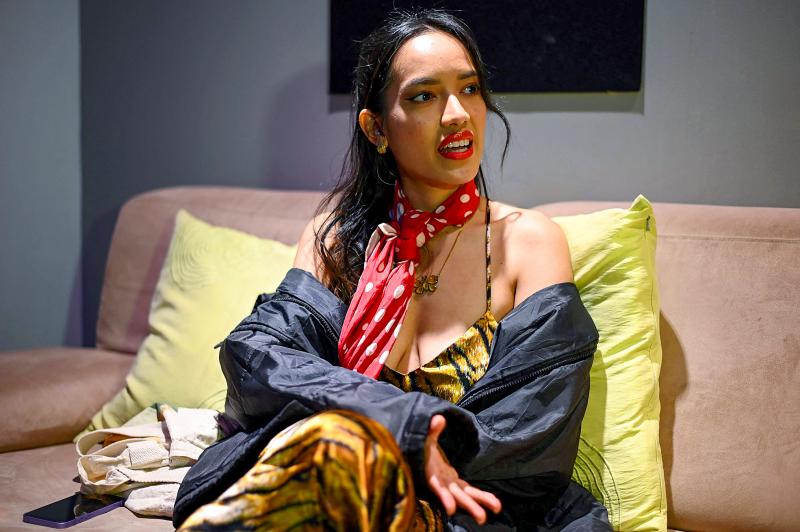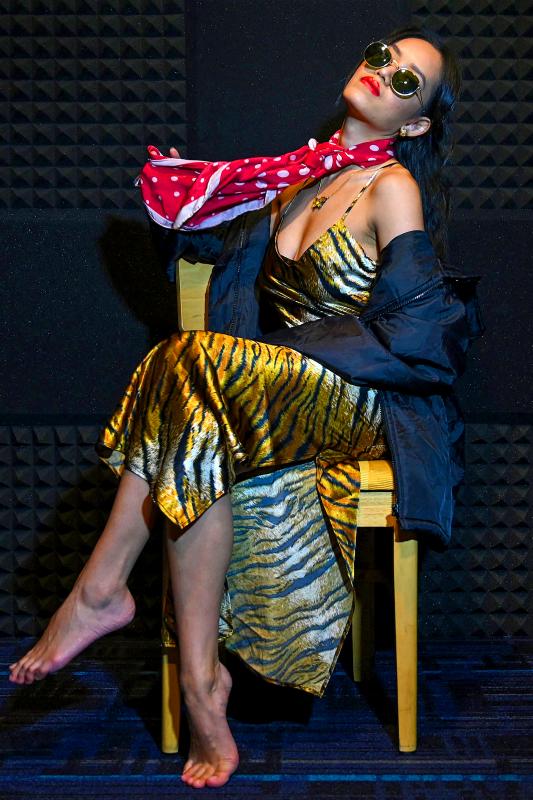Wearing sunglasses and a tiger print dress as she raps into a mic, Malaysian hip-hop artist SYA calls for empowerment while taking a sledgehammer to stereotypes of Muslim women. The first female signing for label Def Jam — the label behind superstars from Jay-Z and Rihanna to BTS and Justin Bieber — in Southeast Asia, her debut single PrettyGirlBop tackles misogyny and acceptance in her Muslim-majority homeland.
“I just want women to feel more comfortable in their own skin,” says SYA, whose long dark hair is uncovered. “I don’t have to pretend to be somebody else just to fit what society deems is good.”
The track, which also features up-and-coming Singapore artist Yung Raja, includes scenes of SYA dressed in white, and stroking a cat wearing a pearl necklace in a lavish bedroom. Underlining her desire that women should not be pigeon-holed, it then switches to her holding a snake and wearing a leopard print jacket, as she defiantly raps: “I wanna be like me.”

Photo: AFP
She is among a crop of young artists from Malaysia, Singapore, Indonesia, Thailand and the Philippines who have been signed by global music giant Def Jam’s Southeast Asian arm. Lauded by the industry as a rising star, the 25-year-old says she faces online abuse from those who believe her behaviour is not appropriate for a young Muslim woman.
“I’ve had a lot of disturbing comments,” the rapper reveals, adding that she has been accused of being a prostitute and had her faith questioned. “’Is she a Muslim? How much per night? Why is she showing so much skin?’”
‘IMPOSTER SYNDROME HIT ME’

Photo: AFP
While Malaysia is a relatively affluent country, society remains largely conservative, with critics saying women’s rights are not sufficiently protected and harassment is common.
SYA says she is facing down the “patriarchal mindset” and “sexualization” of those who don’t conform to the cliched expectations of Muslim women
Most members of Malaysia’s ethnic Malay Muslim community follow a moderate form of the religion and while the majority of women wear a headscarf, there is no law requiring it.
But conservative Islam has been gaining ground, pushed by hardline politicians and preachers, accompanied by growing criticism of any activities and behaviour seen as undermining the faith. For SYA — real name Nur Batrisya Mohammad Nazri — art and religion should be kept firmly separate, however.
“What does (religion) have to do with me as an artist, and what I create?” she said.
The artist, who spent much of her childhood overseas, burst onto the music scene almost by accident when she posted some of her work online, drawing the attention of well-known local rapper SonaOne. He connected her with Def Jam, which had started a push into Southeast Asia, seeking to capitalize on a new wave of regional stars and a youthful demographic with increasing disposable income.
“First and foremost, I consider myself a writer... writing was the reason I am doing all of this... I had never planned to be an artist,” SYA says.
The star confesses she was plagued by “self-doubt” and taken aback by her success. She recalls: “Impostor syndrome really hit me hard. There are other people out there, especially independent artists, who make music 24/7 and are still struggling to get signed.”
‘BE YOUR OWN PERSON’
Growing up, SYA took part in talent shows and listened to artists such as Britney Spears and Michael Jackson.
She later drifted towards hip hop as it was “such an outspoken type of genre.”
Her parents are “getting used to the idea” of her becoming a star, she said, adding that her mum was her “biggest supporter.”
After months of only doing online shows due to a lengthy coronavirus shutdown in Malaysia, she now plans to return to live performing. SYA has yet to run into trouble with authorities but artists regularly do in Malaysia.
Rapper Namewee, from the country’s ethnic Chinese minority, relocated to Taiwan after controversy over videos he made that critics allege insult Islam. Despite this, SYA still thinks male artists have far more freedom to rap about sensitive subjects in the conservative country without fear of being criticised. “For the boys, there are no limitations. If they want to rap about sex or weed, it is a pass,” she said. “But for women, if you are Malay, you don’t want to insinuate you are doing all of those things.”
SYA hopes her music inspires other women — not to emulate her, but to be more confident in themselves. “I don’t want to be the perfect role model,” she said. “You can take inspiration from me [to] be your own person.”

March 10 to March 16 Although it failed to become popular, March of the Black Cats (烏貓進行曲) was the first Taiwanese record to have “pop song” printed on the label. Released in March 1929 under Eagle Records, a subsidiary of the Japanese-owned Columbia Records, the Hoklo (commonly known as Taiwanese) lyrics followed the traditional seven characters per verse of Taiwanese opera, but the instrumentation was Western, performed by Eagle’s in-house orchestra. The singer was entertainer Chiu-chan (秋蟾). In fact, a cover of a Xiamen folk song by Chiu-chan released around the same time, Plum Widow Missing Her Husband (雪梅思君), enjoyed more

Last week Elbridge Colby, US President Donald Trump’s nominee for under secretary of defense for policy, a key advisory position, said in his Senate confirmation hearing that Taiwan defense spending should be 10 percent of GDP “at least something in that ballpark, really focused on their defense.” He added: “So we need to properly incentivize them.” Much commentary focused on the 10 percent figure, and rightly so. Colby is not wrong in one respect — Taiwan does need to spend more. But the steady escalation in the proportion of GDP from 3 percent to 5 percent to 10 percent that advocates

A series of dramatic news items dropped last month that shed light on Chinese Communist Party (CCP) attitudes towards three candidates for last year’s presidential election: Taiwan People’s Party (TPP) founder Ko Wen-je (柯文哲), Terry Gou (郭台銘), founder of Hon Hai Precision Industry Co (鴻海精密), also known as Foxconn Technology Group (富士康科技集團), and New Taipei City Mayor Hou You-yi (侯友宜) of the Chinese Nationalist Party (KMT). It also revealed deep blue support for Ko and Gou from inside the KMT, how they interacted with the CCP and alleged election interference involving NT$100 million (US$3.05 million) or more raised by the

More than 100,000 people were killed in a single night 80 years ago yesterday in the US firebombing of Tokyo, the Japanese capital. The attack, made with conventional bombs, destroyed downtown Tokyo and filled the streets with heaps of charred bodies. The damage was comparable to the atomic bombings a few months later in August 1945, but unlike those attacks, the Japanese government has not provided aid to victims and the events of that day have largely been ignored or forgotten. Elderly survivors are making a last-ditch effort to tell their stories and push for financial assistance and recognition. Some are speaking